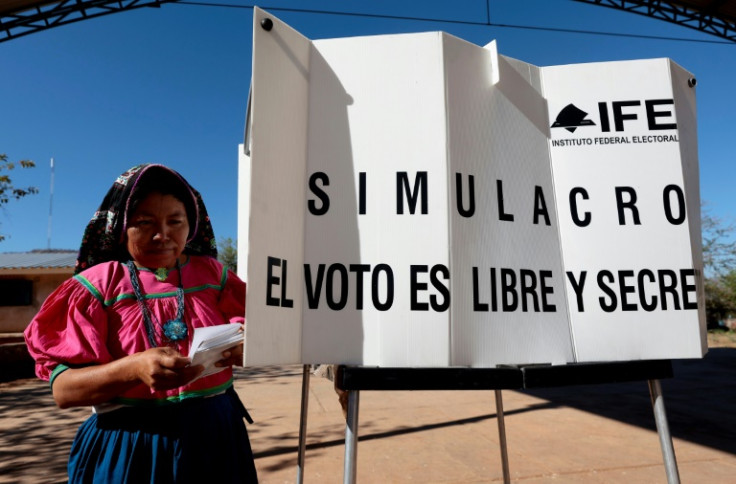
As Mexico prepares for its biggest ever election, rehearsals are taking place in Indigenous towns in remote, often insecure regions where voting in the past has not always gone smoothly.
Electoral officials traveled for several hours into the mountains of western Jalisco state to train members of the Wixarika community, known for their resplendent art and traditional dress.
"We're going to try to learn together what election day will be like," a representative of the National Electoral Institute (INE) told local officials in Tuxpan de Bolanos.
Preparing for the June 2 vote was "a little difficult" given the remoteness of the area, said 50-year-old resident Catrina Avila, who received training on supervising a polling station.
"Sometimes the material doesn't arrive."
In the past, there have been difficulties holding elections in the area, INE representative Roselvet Toledo said.
"So now there's a lot of enthusiasm because they are going to vote, they want to be poll workers, and really the INE benefits -- democracy in general in Mexico benefits," he added.
The Wixarika, also known as the Huichol, are renowned for their intricate beadwork and paintings inspired by the lushly colorful visions experienced when taking peyote, a hallucinogenic drug used in their religious rituals.
In legislative elections in 2021, Wixarika voters sometimes walked for several hours to cast their ballots, despite the threat posed by drug traffickers active in the region.
"The main objective of the INE is to bring each polling station closer to the remotest localities," Toledo said.
For security reasons, the electoral institute team returned to the state capital Guadalajara before nightfall.
On June 2, Mexicans will vote for a new president as well as members of Congress, several state governors and myriad local officials.
In total, more than 20,000 positions are being contested.
Violence usually spikes in the run-up to Mexican elections and this year has been no exception, with around 30 candidates for local office murdered since September.
According to an average of polls compiled by the firm Oraculus, ruling party candidate Claudia Sheinbaum is the presidential frontrunner with 56 percent of voter support.
Opposition rival Xochitl Galvez, who speaks with pride of her Indigenous roots and often wears traditional garments, is second with 34 percent.
Around 23 million people in Mexico identified as Indigenous in a 2020 official census, out of a total population at the time of 126 million.
Another Indigenous group, the Purepecha in the western state of Michoacan, chose their leaders in a vote in the town of Cheran on Sunday.
Fed up with organized crime, residents of Cheran in 2011 became the first community in Mexico to self-govern according to their customs and traditions.
"It hasn't been easy. At first there were consequences," said community leader Marco Hugo Guardian.
"People lost their lives. We faced extortion, threats and some of us were even unable to leave the community due to safety issues," he added.




